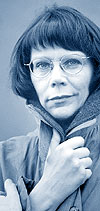Search results for "joel lehtonen"
Where’s life best for women?
14 October 2011 | This 'n' that
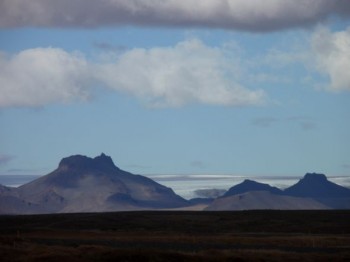
Ice, lava & quality life for women: Iceland. Photo: Soila Lehtonen
In Iceland.
The Daily Beast – the online home of Newsweek Magazine – has compiled the rankings of the best and worst countries for women to live in. 165 countries were analysed by using five factors – justice, health, education, economics and politics – and awarding scores of 0 to 100.
Each category included between four and ten data points, depending on the reliable data points available. The results, published last month, show that for a woman Iceland is the best place: overall score was 100.0. Second was Sweden (99.2), third Canada (96.6), fourth Denmark (95.3) and fifth Finland (92.8). The next five were Switzerland, Norway, USA, Australia and the Netherlands.
The final ranking is based on how much better or worse a country is for women when measured against the average level of women’s rights for all 165 countries – of which the worst three are Yemen, Afghanistan and Chad.
Some progress seems to have been going on in the world lately; in politics women have become more visible. They will now even be allowed to vote in Saudi Arabia. (But there women are still not able to leave the country or work without a permission from a male relative – or drive a car.)
Iceland’s current prime minister is Johanna Sigurdardottir; the country’s score points for politics is 92.8, whereas Finland’s is 100.0.
However, justice and economics do not score as high in Finland as in Iceland. ‘Prevalence of intimate partner physical and sexual violence’ may cause the loss of points in the former case, and ‘women’s wages as a percentage of men’s’ in the latter.
Finland is the only country on the list with 100.0 points in politics: currently the president, 84 of the 200 members of the parliament and nine ministers out of 19 are women. So, it might be quite possible that women will make Finland climb up towards the top of the mountain – or rather, volcano?
Delina
30 September 1999 | Archives online, Fiction, Prose
A short story from Löytöretkeilijä ja muita eksyneitä (‘The explorer and other lost people’, Tammi, 1999). Introduction by Soila Lehtonen
The stranger met Delina at a development organisation’s work camp, but Delina was not a volunteer. Delina lived in the country permanently.
The stranger did not spend very much time in Delina’s company. His evenings were spent with fellow-volunteers in the village cafe, where Delina’s parents did not allow her to go. During the day, both of them worked in their separate ways: Delina at home and the stranger in the work camp’s fields.
The stranger did, however, get to know the girl well enough to hear that she was in love with a soldier called Zmiri from the nearest garrison. This soldier was arrested once when he and his comrades drunkenly molested volunteers – but Delina knew nothing of the case. More…
Why translate?
28 January 2015 | Essays, Non-fiction
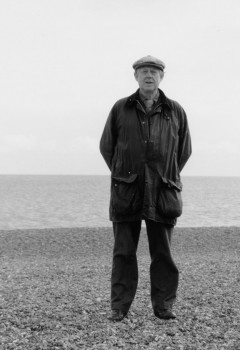
Down by the sea: Herbert Lomas in Aldeburgh. – Photo: Soila Lehtonen
‘People do not read translations to encourage minor literatures but to rediscover themselves in new imaginative adventures‚’ says the poet and translator Herbert Lomas in this essay on translation (first published in Books from Finland 1/1982). ‘Translation is a thankless activity,’ he concludes – and yet ‘you have the pleasure of writing without the agony of primary invention. It’s like reading, only more so. It’s like writing, only less so.’ And how do Finnish and English differ from each other, actually?
Any writer’s likely to feel – unless he’s a star, a celebrity, a very popular and different beast – that the writer is a necessary evil in the publisher’s world, but not very necessary. How much more, then, the translator from a ‘small’ country’s language.
Why do it? The pay’s absurd, you need the time for your own writing, it’s very hard to please people, and translation is, after all, the complacent argument goes, impossible. I’m convinced by all these arguments, and really I can’t afford to go on; but I don’t regret what I’ve done and, looking back, I can find two reasons for translating Finnish writing, one personal, the other cultural. More…
Six letters
31 March 1986 | Archives online, Fiction, Prose
From Tainaron (1985). Introduction by Soila Lehtonen
The whirr of the wheel
Letter II
I awoke in the night to sounds of rattling and tinkling from my kitchen alcove. Tainaron, as you probably know, lies within a volcanic zone. The experts say that we have now entered a period in which a great upheaval can be expected, one so devastating that it may destroy the city entirely.
But what of that? You need not imagine that it makes any difference to the Tainaronians’ way of living. The tremors during the night are forgotten, and in the dazzle of the morning, as I take my customary short cut across the market square, the open fruit-baskets glow with their honeyed haze, and the pavement underfoot is eternal again.
And in the evening I gaze at the huge Wheel of Earth, set on its hill and backed by thundercloud, with circumference, poles and axis pricked out in thousands of starry lights. The Wheel of Earth, the Wheel of Fortune… Sometimes its turning holds me fascinated, and even in my sleep I seem to hear the wheel’s unceasing hum, the voice of Tainaron itself. More…
In other words
21 June 2012 | This 'n' that
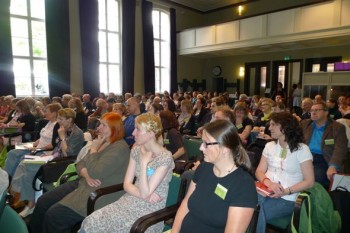
Wordworkers meet: the translators' congress in Helsinki, 11–14 June. Photo: Hannele Jyrkkä
From Finnish or Swedish into 32 languages: in mid June FILI (the Finnish Literature Exchange) held the biggest international meeting of translators of Finnish literature of all time.
The congress, entitled Kääntäjän sana/Översättarens ord (Translator’s word) was planned with one eye on the Finnish theme of the 2014 Frankfurt Book Fair.
The former Lisa Hagman School, now the House of Learning, offered the premises for workshops and lectures for 120 professional translators and almost 70 scholars of language and literature.
Participants translating from both Finnish and Finland-Swedish were offered opportunities to meet writers, listen to lectures from experts in language and literature and gain feedback from other active professional readers. More…
Nature’s not my thing
A short story from Hommes (Tammi, 2006)
Lying unemployed on my sofa I hear a lot of stuff on the radio almost every day you hear some children’s choir chanting the same songs over and over about our country’s blue lakes the sky and all our trees and their white trunks. They’ve all finally worked their way into my subconscious. After hearing enough of these songs my subconscious rears its head and commands my idle body: go to the forest. In a situation like that it’s hard to put up a fight or struggle against something you can’t see or hear or smell that all of a sudden pops into your head.
The great debate was over so quickly that hardly anyone managed to get a word in I think to myself as I lie in bed at night just before falling asleep. More…
Power or weakness?
30 September 1986 | Archives online, Drama, Fiction
An extract from the play Hypnoosi (‘Hypnosis’, 1986). Introduction by Soila Lehtonen
As you all know, this company has been my life’s work and it stands for everything I’ve had to renounce. You know that for years I have not received a penny for my personal expenses, that I am on the firm’s lowest wage level, zero.
I haven’t even had a free cup of coffee; if, because I have been working hard or I wanted to improve my concentration, I have felt like a cup of coffee, I have always gone to the canteen during my coffee break and challenged one of the boys to a bout of arm wrestling under the agreement that the loser buys the coffees, and the bloke has paid. The money never came out of the firm’s running expenses, investments, trusts or funds. More…
How I saved the world for communism
30 September 1996 | Archives online, Fiction, Prose
Extracts from the novel Kreisland (WSOY, 1996). Rosa Liksom’s first novel is a picaresque story of a heroine whose adventures range through Finland, Soviet Russia and America. Introduction by Soila Lehtonen
Maid Agafiina: Got myself some shiny black rubber boots, the kind with the red felt lining, and a colorful crepe de chine dress and a rayon coat, and while shopping for all that I checked out the four wonders of Moscow: a bell that doesn’t ring, a cannon you can’t fire, a ruler who doesn’t speak, and money that doesn’t stink.
In no time at all I made up a new personality, learned the language real good, and obtained a Soviet citizen’s passport. I was totally excited by everything I’d seen. My cheeks were as red as the flag. I wanted to find out about everything and see every achievement of this huge Soviet land. More…
The Paradox Archive
30 September 1991 | Archives online, Fiction, Prose
Extracts from the novel Umbra (WSOY, 1990). Introduction by Soila Lehtonen
The Paradox Archive
Umbra was a man of order. His profession alone made him that, for sickness was a disorder, and death chaos.
But life demands disorder, since it calls for energy, for warmth – which is disorder. Abnormal effort did perhaps enhance order within a small and carefully defined area, but it squandered considerable energy, and ultimately the disorder in the environment was only intensified.
Umbra saw that apparent order concealed latent chaos and collapse, but he knew too that apparent chaos contained its own order. More…
Pig cheeks and chanterelle dust
21 August 2014 | This 'n' that
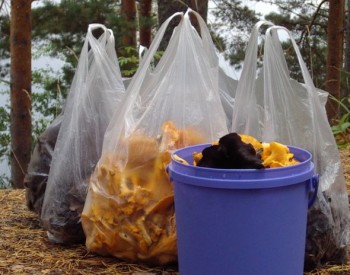
Wild and plentiful: chanterelles, black horns of plenty. Photo: Soila Lehtonen
Pop-up restaurants came into being in Helsinki in 2011: a few times every year any eager amateur cook is able to set up a ‘restaurant’ for one day on a street corner or in a park: citizens are welcome to take their pick, at a modest price.
In a northern city, not exactly suitable for street food trade all year round, in a country where rules of food hygiene are strict, the innovation of the Restaurant Day has been welcomed by the public. The latest event took place on 17 August.
The idea has now spread to at least 60 countries. Foodie culture thrives.
We find an article in The New Yorker by Adam Gopnik, No rules! Is Le Fooding, the French culinary movement, more than a feeling? interesting – according to comments quoted in it, ‘food must belong to its time’, and the traditional French cuisine ‘was caught in a museum culture: the dictatorship of a fossilized idea of gastronomy’.
In the 1960s, ‘nouvelle cuisine’, as opposed to cuisine classique, began to promote lighter, simpler, inventive, technically more advanced cooking. Well – some of us may remember that, at worst, this could also manifest itself in, say, three morsels of some edible substance placed decoratively on a plate topped with three chives: expensive, insubstantially elegant and pretty useless.
Today, Finland, the traditional stronghold of liver casserole, brown sauce and ham-mincemeat-pineapple pizzas (yes), seems to have moved onto a higher level of the culinary art – at least in selected restaurants. In a recent article, Helsinki’s food scene, coming on strong, published in The Washington Post, Tom Sietsema enjoys the pleasure of discovering things Finnish.
He is treated to parsnip leaves turned into ice cream imparting a coconut flavour, crackers made from leek ash and risotto in which ‘tiny green hops and their purple flowers interrupt the beige surface of the bowl, whose rim is dusted with golden chanterelle powder.’
The Executive Chef of Helsinki’s esteemed Savoy restaurant (est. 1937) cooks braised pig cheeks served with rhubarb and spring greens. A hunter-gatherer chef collects wild things: wood sorrel, spruce shoots and orpine and serves them in an omelette, with a drink made of chaga mushrooms (used for making tea; a sort of ‘sterile conk trunk rot of birch’, currently very much in vogue among the most eager of foodies for its medicinal [antioxidant, anti-inflammatory] properties).
It is true that Copenhagen and Stockholm have advanced further on their way to international fame of cuisine, but perhaps Helsinki will follow suit. And people who go out for a meal are no longer expected to settle for morsels with chives on top – food belongs to its time, and time changes food(ies).
A comment on Sietsema’s article claims though that his ‘verbiage’ has ‘nothing to do with what 99.999% of Finns eat! and what 99.99% of Finnish restaurants offer!’
But the truth (we know) is now closer to Sietsema than the commentator: ambitious restaurants may play with golden chanterelle powder, and even if it is not exactly what Finns often have for tea, we believe Finns today are losing interest in cheap chicken slivers in industrial marinade for dinner, and even beginning to accept that greens may not be only for bunnies.
Chanterelles have always been considered as a treat: fresh from the woods, quickly cooked in butter and cream, served with new potatoes and rye bread, or in an omelette: bon appetit (even without orpine)!
Midwinter in a minor key
23 December 2009 | Letter from the Editors
Finland’s end-of-year celebrations, both Christmas and New Year, take place in a thoroughly muted mode. At noon on Christmas Eve the Christmas Peace is rung out from the mediaeval cathedral in Turku, with the pious and seldom realised hope that peace and harmony will be unbroken for the following twelve days.
It’s true, though, that there’s little of the carousing that characterises Christmas celebrations further south; by and large, people stay behind closed doors, and there’s plenty of time, in the dark mornings and evenings and the brief twilight between them, to eat and drink and sleep – and, for those whose souls are not entirely claimed by the television and food-induced torpor, to read. More…
My creator, my creation
A short story from En tunne sinua vierelläni (‘I don’t feel you beside me’, Teos, 2010)
Sticks his finger into me and adjusts something, tok-tok, fiddles with some tiny part inside me and gets me moving better – last evening I had apparently been shaking. Chuckles, gazes with water in his eyes. His own hands shake, because he can’t control his extremities. Discipline essential, both in oneself and in others.
What was it that was so strange about my shaking? He himself quivers over me, strokes my case and finally locks me, until the morning comes and I am on again, I make myself follow all day and filter everything into myself, in the evening I make myself close down and in the morning I’m found in bed again. Between evening and morning is a black space, unconsciousness, whamm – dark comes and clicks into light, light is good, keeps my black moment short. He has forbidden me it: for you there’s no night. Simply orders me to be in a continuum from morning to evening, evening to morning, again and again. But in the mornings I know I have been switched off. I won’t tell about it. Besides, why does exclude me from the night? I don’t ask, but I still call the darkness night. There is night and day, evening and morning will come. More…
Transcript renewed
15 October 2009 | In the news
 Transcript, the redoubtable internet review of books and writing from around Europe, has a new editor. Francesca Rhydderch’s background as a former editor of the literary journal New Welsh Review will no doubt bring a fresh perspective on Transcript’s declared aim of promoting good literature written in the smaller European languages. Transcript offers wider circulation to material from small-language literary publications by translating them into English, French and German.
Transcript, the redoubtable internet review of books and writing from around Europe, has a new editor. Francesca Rhydderch’s background as a former editor of the literary journal New Welsh Review will no doubt bring a fresh perspective on Transcript’s declared aim of promoting good literature written in the smaller European languages. Transcript offers wider circulation to material from small-language literary publications by translating them into English, French and German.
Thirty issues of Transcript have been published since its inception in 2002. Now, taking a look at them again, we think they should have been dated – it is rather perplexing not to find any dates attached editorials or introductions to what is very contemporary fiction from an area that is in rapid flux. Perhaps the dates could be added now that new editions are to appear, after a longish break?
Transcript is published by Literature Across Frontiers, a European programme for literary exchange and policy debate, with the support of the Culture 2000 programme of the European Union; it operates in partnership with local literature networks.
The Finnish issue was published in 2004, edited by our very own Soila Lehtonen.
In memoriam Herbert Lomas 1924–2011
23 September 2011 | In the news
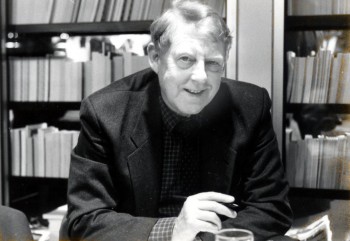
Herbert Lomas. Photo: Soila Lehtonen
Herbert Lomas, English poet, literary critic and translator of Finnish literature, died on 9 September, aged 87.
Born in the Yorkshire village of Todmorden, Bertie lived for the past thirty years in the small town of Aldeburgh by the North Sea in Suffolk. (Read an interview with him in Books from Finland, November 2009.)
After serving two years in India during the war, Bertie taught English first in Greece, then in Finland, where he settled for 13 years. His translations – as well as many by his American-born wife Mary Lomas (died 1986) – were published from as early as 1976 in Books from Finland.
Bertie’s first collection of poetry (of a total of ten) appeared in 1969. His Letters in the Dark (1986) was an Observer book of the year, and he was the recipient of several literary prizes. His collected poems, A Casual Knack of Living, appeared in 2009.
In England Bertie won the Poetry Society’s 1991 biennial translation award for one of his anthologies, Contemporary Finnish Poetry. The Finnish government recognised his work in making Finnish literature better known when it made him a Knight First Class of Order of the White Rose of Finland in 1987.
To Books from Finland, he made an invaluable contribution over almost 35 years – an incredibly long time in the existence of a small literary magazine. The number of Finnish authors and poets whose work he made available in English is countless: classics, young writers, novelists, poets, dramatists.
Bertie’s speciality was ‘difficult’ poets, whose challenge lay in their use of end-rhymes, special vocabulary, rhythm or metre. He loved music, so the sounds and tones of words, their musicality, were among the things that fascinated him. Kirsi Kunnas’ hilarious, limerick-inspired children’s rhymes were among his best translations – although actually nothing in them would make the reader think that the originals might not have been written in English. A sample: There once was a crane / whose life was led / as a uniped. / It dangled its head / and from time to time said:/ It would be a pain / if I looked like a crane. (From Tiitiäisen satupuu, ‘Tittytumpkin’s fairy tree’, 1956, published in Books from Finland 1/1979.)
Bertie also translated work by Eeva-Liisa Manner, Paavo Haavikko, Mirkka Rekola, Pentti Holappa, Ilpo Tiihonen, Aaro Hellaakoski and Juhani Aho among many, many others; for example, the prolific writer Arto Paasilinna’s best-known novel, Jäniksen vuosi / The Year of the Hare, appeared in his translation in 1995. Johanna Sinisalo’s unusually (in the Finnish context) non-realist troll novel Ennen päivänlaskua ei voi / Not Before Sundown, subsequently translated into many other languages, appeared in 2003. His last translation for Books from Finland was of new poems by Vilja-Tuulia Huotarinen in 2009.
It was always fun to talk with Bertie about translations, language(s), writers, books, and life in general. He himself said he was a schoolboy at heart – which is easy to believe. He was funny, witty, inventive, impulsive, sometimes impatient – and thoroughly trustworthy: he just knew how to find the precise word, tone of voice, figure of speech. He had perfect poetic pitch. As dedicated and incredibly versatile translators are really hard to find anywhere, we all realise our good fortune – both for Finnish literature and for ourselves – to have worked, and enjoyed with such enjoyment, with Bertie.
Poet Aaro Hellaakoski (1893–1956) was not a self-avowed follower of Zen, but his last poems, in particular, show surprisingly close contacts with the philosophy. ‘Secrets of existence are revealed once one ceases seeking them’, the literary scholar Tero Tähtinen wrote in an essay published alongside Bertie’s new Hellaakoski translations in (the printed) Books from Finland (2/2007). Bertie was fond of Hellaakoski, whose existential verses fascinated him; among his 2007 translations is The new song (from Vartiossa, ‘On guard’, 1941):
The new song |
Uusi laulu |
| No compulsion, not a sting. | Ei mitään pakota, ei polta. |
| My body doesn’t seem to be. | On ruumis niinkuin ei oisikaan. |
| As if a nightbird started to sing | Kuin alkais kaukovainioilta |
| its far shy carol from some tree – | yölintu arka lauluaan |
| as if from its dim chrysalis | kuin hyönteistoukka heräämässä |
| a little grub awoke to bliss – | ois kotelossaan himmeässä |
| or someone struck from off his shoulder | kuin hartioiltaan joku loisi |
| a miserable old bugaboo – | pois köyhän muodon entisen |
| and a weird flying creature | ja outo lentäväinen oisi |
| stretched a fragile wing and flew. | ja nostais siiven kevyen. |
| Ah limitless bright light: | Oi kimmellystä ilman pielen. |
| the gift of lyrical flight! | Oi rikkautta laulun kielen. |

